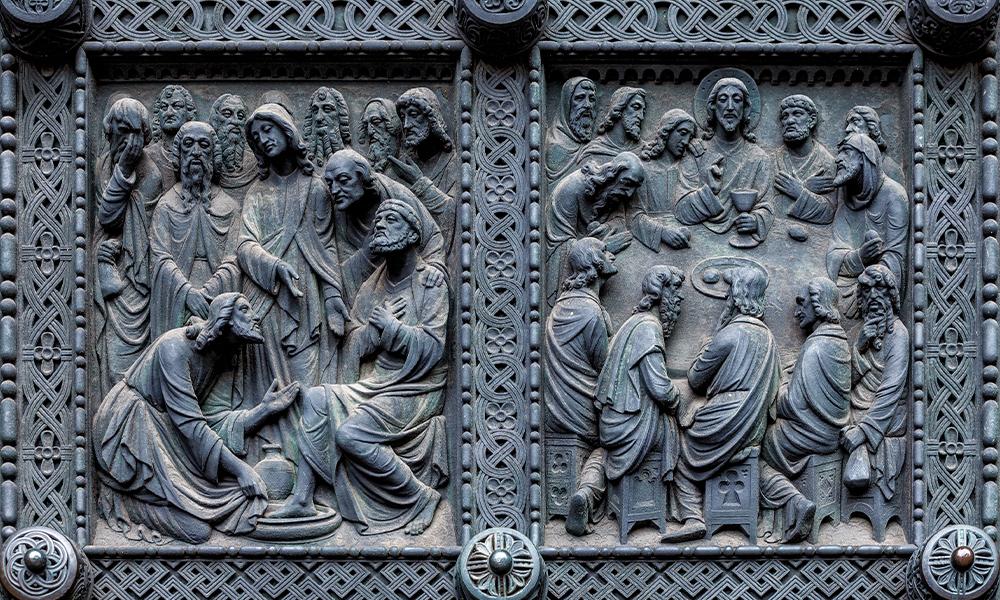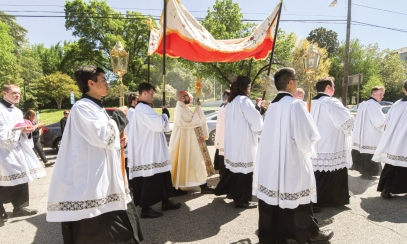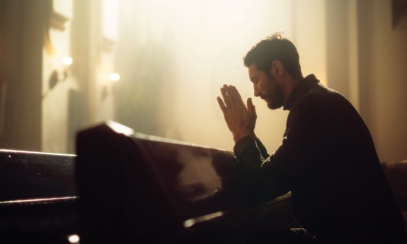
Part 9: The Eucharist – A Sacrament of Humility
¡Lee este artículo en español!
One of my favorite liturgical celebrations of the year occurs during the Paschal Triduum, the three days where we commemorate in a special way the Paschal Mystery — the passion, death and resurrection of Jesus Christ. On Holy Thursday, we celebrate the Evening Mass of the Lord’s Supper. As the name suggests, we particularly celebrate the event when the gift of the Eucharist was given to us. When we go to Mass on Holy Thursday, we expect to hear in the Gospel the retelling of that first Eucharist, the sacrificial meal where we encounter the new and true Lamb sacrificed for us. We expect to hear those famous “words of institution,” when Christ tells us what is really being offered — his body and blood, his very self.
¡Lee este artículo en español!
One of my favorite liturgical celebrations of the year occurs during the Paschal Triduum, the three days where we commemorate in a special way the Paschal Mystery — the passion, death and resurrection of Jesus Christ. On Holy Thursday, we celebrate the Evening Mass of the Lord’s Supper. As the name suggests, we particularly celebrate the event when the gift of the Eucharist was given to us. When we go to Mass on Holy Thursday, we expect to hear in the Gospel the retelling of that first Eucharist, the sacrificial meal where we encounter the new and true Lamb sacrificed for us. We expect to hear those famous “words of institution,” when Christ tells us what is really being offered — his body and blood, his very self.
Yet, when it comes time to listen to the Gospel in the Liturgy of the Word on that evening, we hear something else.
When the Last Supper is proclaimed, we hear the version from John’s Gospel that, although significantly longer than those in the Synoptic Gospels of Matthew, Mark and Luke, does not contain those famous words. Does that mean John doesn’t think the Eucharist is important? Simply skimming through his Gospel, where we find the Bread of Life discourse, dispels that notion. A deeper dive into John unearths numerous instances of indirect and direct eucharistic theology. What exactly is it that we see instead of the “institution narrative” and what is it trying to tell us?
At this key moment in the story, and at this key celebration of Holy Thursday when we are expecting those precious words, “This is my body...,” the Gospel writer recognizes an opportune time to give us a lesson on the Eucharist. Instead of the words of institution, Jesus, the master, takes the role of the servant by washing his disciples’ feet. Then, he commands them to follow his example.
This moving and significant gesture is one we continue to imitate every time we commemorate Holy Thursday. It’s important not to lose sight of the fact that this message of service is not meant to direct our attention away from the Eucharist. Instead it focuses our attention on what the Eucharist is about. Here at the Last Supper, John tells us what the meaning and consequences of that Real Presence truly are.
In the Eucharist, Christ our master becomes our servant, humbling himself to meet our needs. The Eucharist, then, is the ultimate example of Christ’s humble selfemptying. It is the same as the Incarnation, God becoming human, and is a consequence and extension of it. The Gospel passage tells us all we need to know about the Eucharist and the Incarnation, too. Christ, the master, stoops to wash feet. He is signaling that he has come to serve, as the physical gesture of getting on the floor and washing dirty feet indicates, plus he is signaling the cleansing and transformation that comes through receiving his gift of self, the very gift we receive in the Eucharist.
There is something significant about his choosing to wash feet and choosing these feet in particular. What will the feet that he washes at the Last Supper eventually go and do? They will carry the Gospel to the ends of the earth. These are the Apostles who will tell the world of the Good News of salvation through Jesus. Even in a negative way — remember, God transforms evil into good — Judas’ feet serve the mission in that they carry him to commit an act of betrayal that Jesus transforms into a salvific sacrifice, the sacrifice we encounter in the Eucharist.
But the passage doesn’t simply end with a note about Christ’s humble service, calling forth our gratitude. Although gratitude is warranted: Eucharist means thanksgiving after all. It’s not only gratitude that is demanded of us in the Eucharist. Jesus commands his disciples, including us, to follow his example.
Christ’s gift of self in the Eucharist always calls forth a response in kind from us. The Eucharist calls us to serve the Lord and one another. Christ’s humility invites us to strive for humility ourselves. This humble gesture of becoming servants, which we can imitate in a variety of ways in our lives, reminds us that we are serving Christ and that this service is our true calling.
We must also remember that when we correctly follow Jesus’ example and become servants, we too are preparing the feet of other disciples who will continue to serve the mission of Christ and his Church — and bring the Gospel to the ends of the earth.
Michael Martocchio, Ph.D., is the secretary of evangelization and the director of the Office of Catechesis and Christian Initiation. Email him at mmartocchio@charlestondiocese.org.



